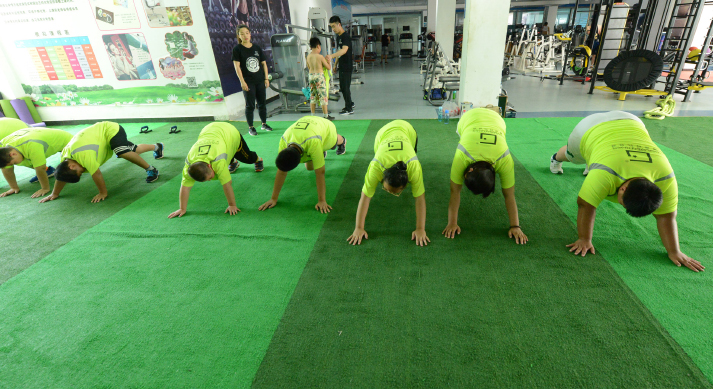| China |
| China's chubby children struggle to fit in | |
|
|
 Campers do pushups under the supervision of an instructor at a weight loss camp in Zhengzhou City, Henan Province, in July 2017 (VCG)
Fact: About 41.1 percent of Chinese men are overweight or obese, compared with 27.7 percent of Chinese women, according to a study published on August 17 in the medical journal Diabetes, Obesity and Metabolism, English-language newspaper China Daily reported. Fact: Like the waistlines of Chinese adults, the girth of the country's youngest generations, too, continues to expand. Fact: For many young Chinese students, the July-August school vacation is not a time for play, fun excursions, amusement park shenanigans or discovering new, uncharted territory, but rather a period of intense workouts—at weight loss camps. Fitting in Around 8 p.m. on any given day, the following scenario will unfold before the eyes of yours truly at her Beijing compound: a slightly plumper young boy runs around the compound's fengshui styled garden for five minutes, followed by one minute of jumping rope. He keeps this up for half an hour. All under the eagle-eyed supervision of his mom—Mrs. Wang. Wang said her 11-year-old son had attended a 21-day weight loss camp for pre-teens in the suburbs of Beijing in late July. The idea had been hers and she'd had no qualms about sending her kid away to get him in shape. Under the supervision of very strict trainers, campers swim, run, lift weights and do other exercises on a daily basis—accompanied by non-sugary drinks and nutritious, hold-the-carbs meals. The professionals guiding the children take a whole-health approach designed to transform every camper in three essential areas: physical, emotional and social. They are also required to undergo medical examinations and weigh-ins conducted by professional nurses. "Some aren't exactly happy campers given the regime can be a bit rigorous compared to what they're used to at home, but my son benefited from this. He shed 5 kg in three weeks. And I intend to try my best to help him shed a few more kilograms so he will fit into the average height-weight range," Wang told Beijing Review. "But, truth be told, it's not just about fitting into an average range or average clothing size; it's really about fitting into society," she summed up. Food for thought… With the increased prevalence of overweight and obese children, the Middle Kingdom, as of this year, had 2,000 registered weight loss camps for children, and these camps became popular "vacation destinations" over the recent summer break, according to PubMed, the most popular bibliographic database in the health and medical sciences. The sedentary stats Fact: the extreme popularity of these "boot camps" for kids tells that childhood obesity today is actually an alarming trend in China. Fact: according to a report published by the National Health Commission (NHC) in 2020, one in five Chinese youth aged 6-17 was overweight or obese, up from just one in 20 in 1995. Fact: by comparison, according to the United States Centers for Disease Control and Prevention, the prevalence of obesity among children and adolescents aged 2-19 in the U.S. between 2017 and 2020, was also one in five. Globally top-ranked American healthcare organization the Mayo Clinic defines the body mass index (BMI), a person's weight in kilograms divided by the square of their height in meters, as the accepted measure of overweight and obesity. A BMI of 25-29.9 is considered overweight and one of 30 and over obese. Though for children and adolescents there may be other factors that come into play, the BMI remains a good indicator. This increasing chubbiness of Chinese youth is driven by multiple social factors. Heavy coursework at school and the ubiquitous, ready availability of digital devices are steering the country's younger generations toward a more sedentary lifestyle. Then there's the age-old belief that more food consumption equals better growth, which has led many parents to "pamper" their children with an unlimited supply of junk food and late-night snacks. But it's not just the parents… Grandma and grandpa's sugary, savory, super-processed tasty treats, too, can have a detrimental impact on their beloved grandchild's diet. A 2018 study published in the International Journal of Behavioral Nutrition and Physical Activity concluded that Chinese children who had two or more grandparents living with them had a 70 percent higher risk of being overweight or obese, compared to those with no "live-in" grandparents. It's not uncommon for three generations to live under one roof in China. In fact, many parents rely on grandparents to look after their offspring when they're at work. But this can create a problem, especially under China's family-planning policy that allowed most urban couples to have only one child, which started in the late 1970s and ended after about three decades. It's a phenomenon often referred to as the "single family treasure," in which one single child may have up to four doting grandparents in addition to their two parents. Many Chinese grandparents, too, often still believe that the concept of "fattening" is healthful, a misconception that stems largely from their own experiences with food shortages. A colleague of this author, surnamed Li, mother to a 7-year-old boy, can testify to just that. Her son has always been on the heavier side of the growth curve and, therefore, this mama bear has been keeping a close eye on his diet since he was 2. "When he's at home, and eats what I give him, his weight remains stable," she said, before sighing. "But when he's with his grandparents for a week, like he was during Spring Festival (China's biggest annual holiday in late January or early February), they tend to spoil him and he gains weight." She continued it took the boy three months to lose the 2 kg he'd gained in seven days. This nuclear family avoids the food traps, the trans fats and steers way clear of the chicken nuggets. Colorful veggies and fruits combined with some very necessary physical activity, as opposed to the "digital sedentary diet" of so many children worldwide, today keep Li's son's weight at mid curve. Of course Li isn't the only example of maternal concern about their child's weight…  On China's super popular lifestyle and e-commerce app Xiaohongshu, or Little Red Book, the hashtag "child weight loss" had raked in more than half a million notes as of August 30. Related hot-to-trot tags on the platform include "child weight loss camps," "healthy meals for children," as seen in this screenshot, and "best sports for children to lose weight" (FILE)
Happy campers? Fact: On China's super popular lifestyle and e-commerce app Xiaohongshu (Little Red Book), the hashtag "child weight loss" had racked up more than half a million notes as of August 30. Fact: Notes on Little Red Book often center on the user's own consumption experience, in this case a parent (usually the mom) reporting on their child's weight loss journey, which serves as a useful guide for other users. Fact: Other related hot-to-trot tags on the platform, usually with notes from mothers and professional nutritionists, include "child weight loss camps," "healthy meals for children" and "best sports for children to lose weight." The 2020 report of China's NHC further revealed a marked increase in the country's child obesity numbers. "This suggests a pressing need for policy responses that may include taxation of food and beverages with added sugars and fats, subsidies to promote dietary diversity, and more strategies to promote physical activity and health education," the report read. An article in China's most widely circulated newspaper People's Daily on July 28 called on parents to closely monitor their children's weight from an early age so that they can promptly intervene when signs of obesity pop up. "That does not mean parents should rely on intermittent fasting or slimming pills for dramatic transformations. A balanced diet, regular physical activity, limited screen time and adequate sleep are enough to help children maintain a healthy weight," the piece concluded. Should they take weight control to the extreme, sooner or later, it may all come crashing down… In the illustrious words of Mrs. Wang: Everything in moderation, even moderation. Fact. (Print Edition Title: Sizing Up a Phenomenon) Copyedited by G.P. Wilson Comments to elsbeth@cicgamericas.com |
|
||||||||||||||||||||||||||||
|
